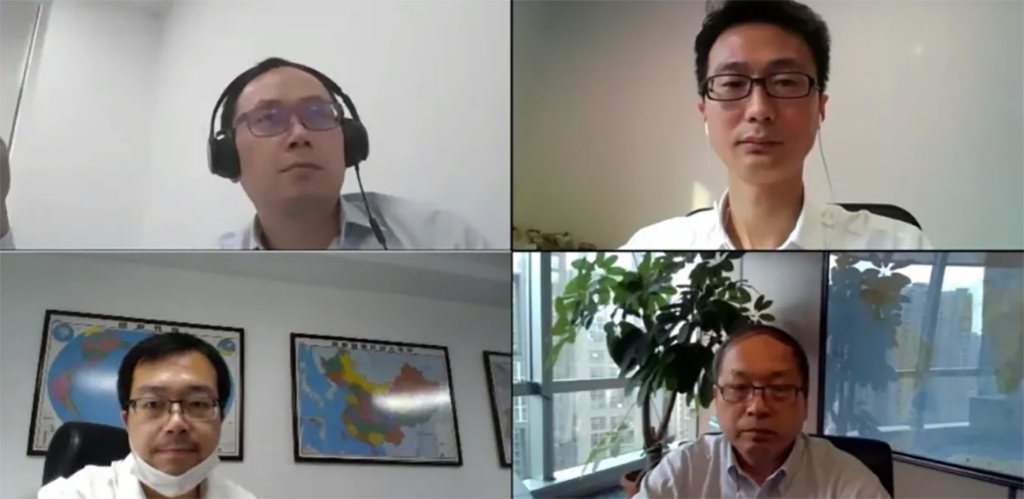Jul 27 | 2020
With input from BIMCO, Powerchina Hubei Electric Engineering, Greenroad International Logistics and COSCO Shipping Specialized Carriers

Focusing on industry challenges brought by the pandemic and discussing the sustainable development of the industry
Breakbulk365’s first online seminar in Shanghai was successfully held on July 7 with Wei Zhuang, Regional Manager (Asia), BIMCO; Feng Chen, General Manager of Marketing Center, COSCO Shipping Specialized Carriers; Morgan Meng, International Business Department Director, Powerchina Hubei Electric Engineering Corporation Limited; and Peter Wang, Marketing General Manager/Project Logistics Manager, Greenroad International Logistics who discussed how to achieve sustainable development for the industry.
Experts who missed the live broadcast or want to watch the video playback, please go to the end of the article for relevant information.
In this webinar, the guests took the challenges brought by the pandemic to the general cargo and project cargo transportation industries as the starting point to discuss how to realize the sustainable development of the industry.
Challenges
At the seminar, Wei Zhuang said that due to the impact of the overseas pandemic, the export volume of materials and conventional trade under international projects has dropped sharply, and the cost has continued to increase. Others such as maritime transport: general cargo and container ship owners have reduced their capacity to reduce expenses, resulting in insufficient export capacity in the Chinese market, tight storage space and a certain increase in freight rates. Regarding air transport: the export volume of pandemic prevention materials has seen a spurt of growth, and the cost of air transportation has risen sharply, resulting in an increase in logistics costs. For international land transportation: Some countries outside China have a policy of closing the country to cope with the spread of the pandemic, resulting in the failure of timely customs clearance and transportation of goods arriving at the port, resulting in a certain backlog and additional production costs.
Countermeasures
After discussing the challenges faced by the guests, in addition to thinking that all parties in the industry need to understand each other and work together to implement the pandemic prevention measures of "external defense import, internal defense rebound," the guests also combined their own sector knowledge to make plans for the industry to achieve sustainable development.
1. Accelerate technological innovation in the industry and realize digital services
Zhuang believes that to realize the sustainable development of the industry, it is necessary to accelerate the technological update of industry digitization. At the same time, Feng Chen also gave an example of the necessity of digital services for special transportation. During the pandemic period, COSCO Shipping Specialized Carriers launched online services and resource sharing to ensure the operation of the entire route, and synchronized the pandemic prevention and control measures of government agencies. It protects the safety of onsite workers and customers, and ensures the quality of logistics services.
2. Focus on operational improvement and accelerate industry integration
The pandemic has caused some logistics companies to shrink their business and tighten their cash flow, so they have to seek to "group for warmth" and pay attention to the improvement of operational quality. Zhuang believes that promoting the centralization of logistics and formulating transportation plans that are more suitable for shippers can better realize the sustainable development of the industry. At the same time, Chen also said that during the pandemic, COSCO Sinotrans is also actively promoting the transformation to a supply chain service provider.
3. Understand the policies and industry trends, and work together to advance the "Belt and Road" strategy
Chen pointed out that in the future, the steel and paper industry will stabilize, while the oil and gas industry may fluctuate. However, no matter how long-lasting the impact of the pandemic on the global economy, the construction of the "Belt and Road" will be China's development focus. Although some projects under construction have stalled in the early stage, they have recently resumed work and production. Morgan Meng firmly believes that China's national 'One Belt One Road' strategy is correct. “We have not made any adjustments to overseas strategies in the face of the pandemic,” Meng said.
4. Adjust service strategy and enhance industry communication
Affected by the pandemic, the project has experienced delayed supply, tight cash flow, and delays in construction progress. Meng said that by strengthening active communication with the owner, many projects have also gained the understanding of the owner, including claims for the construction period and even additions to contracts. At the same time, Chen and Zhuang also pointed out that during the pandemic, the company actively updated the pandemic situation and pandemic prevention measures of various countries to customers, and maintained contact with partners including ports to ensure service quality.
Watch the replay at (Please note: This session was delivered in Chinese.)


